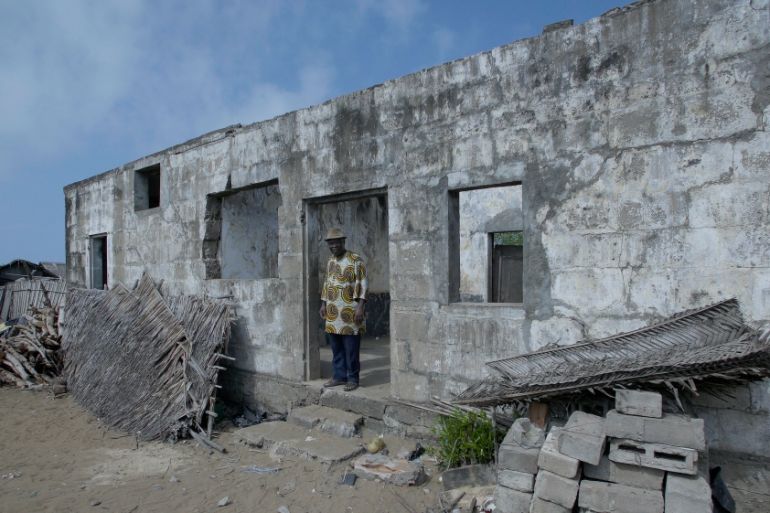‘It may disappear’: Ocean threatens Ivory Coast village
As rising seas and coastal erosion threaten an Ivory Coast village, neighbours are in a fight over dwindling resources.

Lahou-Kpanda, Ivory Coast – Diplo Anacle stands in the doorway of an old prison, once one of dozens of stately seafront buildings erected by French colonialists on this sliver of sand between the Atlantic ocean and a giant lagoon.
Today, the structure in the centuries-old village of Lahou-Kpanda is all that remains from that time.
Keep reading
list of 4 itemsAre seed-sowing drones the answer to global deforestation?
Rainfall set to help crews battling wildfire near Canada’s Fort McMurray
The Alabama town living and dying in the shadow of chemical plants
“This is the last building that exists, but it will not be preserved,” said Anacle, the 65-year-old village chief.
“There is no government funding for preservation. We will lose it and that hurts us, but there is nothing we can do,” he told Al Jazeera.
Rising tides and more frequent, devastating storms are slowly destroying what is left of Lahou-Kpanda, the offshoot of what was once a major colonial town near the mouth of the Bandama River, the longest river in Ivory Coast.
Ocean inches closer
Then known as Grand Lahou, the town was first set up as a slave-trading post, but by the mid-19th century, it had become a thriving commercial centre. The French built grand homes along the beach and tourists later started coming here for the surf and nearby Assagny National Park.
But coastal erosion began taking its toll in the 1970s, and much of the population was settled 30km away in a newly built town by the same name. Two decades later, huge storms destroyed many of the old town’s beachfront homes.
Today, the old Grand Lahou is largely abandoned. But 7,000 people still live in Lahou-Kpanda, the last habitable village.
![Lahou-Kpanda sits on a sliver of sand between the ocean and a lagoon [Brietta Hague/Al Jazeera]](/wp-content/uploads/2018/01/fd64d36b75ae41c980a29540aa7e5c2a_18.jpeg)
The mouth of the Bandama River is moving closer, however, threatening to wash away what is left.
“If we release the figures, people will be scared,” said Tagwa Eric Cavale, a marine and coastal scientist who heads the government’s national programme for coastal environment management.
Warming waters have led to an increase in storm surges, and the ocean is swallowing one to two metres of land each year, Cavale said.
“If we do nothing for this village, it may disappear.”
Fight over resources
As land diminishes, the fight for scarce resources is also intensifying.
Prominent local families own parcels of land west of the village and access to the crops has become a violent point of contention for many villagers.
Al Jazeera witnessed an angry group of youth hurling insults at Anacle, the chief, whom they accused of giving preferential treatment in land allocation to members of his family. Anacle was beaten by the youth and taken to Abidjan, the Ivory Coast’s largest city, with head injuries.
Another resident, Beugre Besnard, 90, said neighbours are turning on each other.
“The sea is destroying everything,” he told Al Jazeera.
“We used to use the sea for everything. It’s so disappointing. When I was a child it was great here. So much joy and so many people, many Europeans enjoying themselves, working and doing many things. Now it just hurts me.”
Calvare said the government does not intervene in social matters, but has applied for World Bank funding to help the villagers combat the “phenomenon of coastal erosion and climate change”.
Ivory Coast also says it is doing its part to fight climate change, committing at the Paris climate talks in 2015 to reduce its greenhouse gas emissions by 28 percent by 2030.
“It is true that we are not a big, industrial country, but we must do our part to make this phenomenon diminish,” said Calvare. “That’s what we must do: reduce the emission of greenhouse gases.”
‘We will have nothing’
West Africa as a whole generates nearly half of its gross domestic product (42 percent) from the region’s coastal areas, where more than 1.6 million tonnes of fish are legally caught every year, according to the World Bank.
Lahou-Kpanda is no exception, as most villagers rely on fishing to survive.
![Fisherman Beugre Jules says the sea is central to life in Lahou-Kpanda [Samuel Ouedraogo/Al Jazeera]](/wp-content/uploads/2018/01/c88c5fffb4b942da972e3a284ae62ffb_18.jpeg)
Beugre Jules, a local security officer who has spent years fishing in the lagoon, said locals would have nothing without access to the sea.
“The sea represents life. If there is no sea there is no food, there’s no life,” he told Al Jazeera.
“If there’s fish, everything works – but if there isn’t, life is difficult. Everything is centred around this,” he added.
“It hurts me because one day the sea will take the entire village and we will have nothing and we’re going to have to move and we have no idea where we are going.”